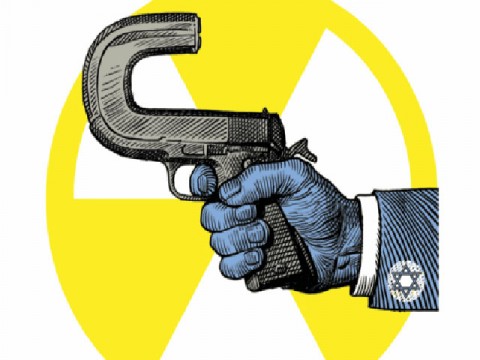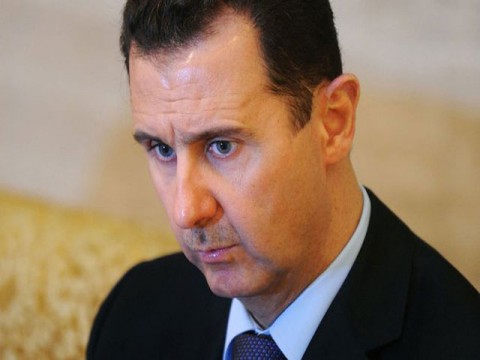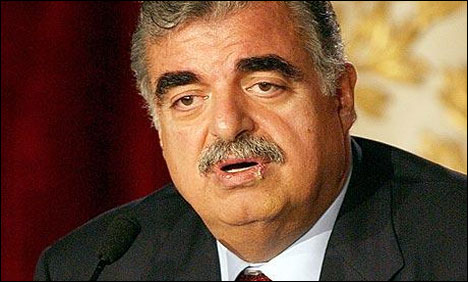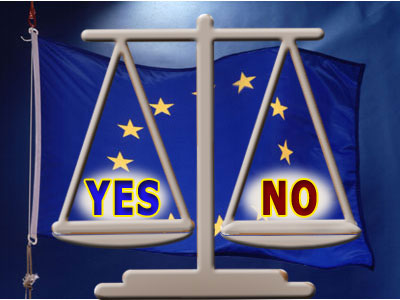- Web
- Humsa
- Videos
- Forum
- Q2A



peaking at the American Israel Public Affairs Committee’s (Aipac) annual conference, US Vice-President Joe Biden insisted that President Barack Obama was not bluffing about using force to thwart Iran’s nuclear ambitions.
Israeli Prime Minister Benjamin Netanyahu, too, called for a “clear and credible military threat” against Tehran, underscoring that sanctions alone would not make Iran cave at the negotiation table.These threats were issued at a time when the latest round of nuclear talks between Iran and the P5+1 in Kazakhstan were positively characterised, by many accounts, as a ‘turning point’. New rounds of negotiations were set to take place in April.
If we set aside all the ethical and political implications of threatening a negotiating party in the course of negotiations (especially at a time when talks seem finally to be heading in the right direction), there are at least two major legal issues with these threats that seem to have fallen into America’s blind spot.
First, the ‘threat of force’ against a sovereign member of the United Nations is illegal under international law. It violates Article 2(4) of the UN Charter, which unequivocally requires all member-states to “refrain in their international relations from the threat or use of force.”
The term ‘threat’ refers to a government’s announcement of an act of violence for the purpose of intimidating another government into changing its policies. Under the Charter, only the Security Council is qualified to make such threats.
Every other threat of force is unlawful.It should also be understood that ‘threat’ within the meaning of Article 2(4) must be understood in a restrictive sense. Hostile statements that are common between antagonistic countries, especially when they’re uttered by officials who do not have the constitutional authority to materialize them, do not carry the same legal weight as potent military threats directly issued in a particular context (for the purpose of influencing negotiations) by top officials who actually have the power to order military operations.
Alarming devel
Watching the highest political authorities of Israel and the US so impetuously violate a fundamental rule of international law is on its own very alarming. It signals to Iran and the international community that the West is not willing to play by the rules. It also greatly undermines the credibility and impartiality of all international organisations involved in the negotiating process.
Some would rightly argue that if any other state had so blatantly breached such a central bedrock of the post-UN charter international order, the Security Council or, at least, the secretary-general of the United Nations would have certainly issued a strong condemnation in reply.
Second, and more important, according to a well-known principle of international law, an agreement that is obtained through duress and coercion is considered invalid. The 1969 Vienna Convention on the Law of Treaties, which codifies some of the most fundamental norms in the field, is very clear on the subject.
Its Article 52 specifically renders void any international agreement “which has been procured by the threat or use of force in violation of the principles of international law.”The International Court of Justice confirmed this position in a 1973 case between the United Kingdom and Iceland, stating in very clear terms that: “There can be no doubt, as is implied in the Charter of the United Nations and recognised in Article 52 of the Vienna Convention on the Law of Treaties, that under customary international law, an agreement concluded under the threat of force is void.”
In other words, even if Tehran does cave in to the “clear and credible military threat” that Netanyahu expects world powers to put forth, and if it actually concedes to a nuclear agreement procured under duress, Iran could very well invoke Article 52 to nullify it at later date. In fact, the military threat that Aipac, Netanyahu, and his American backers seem to view today as valuable ‘leverage’ in the ongoing negotiations with Iran could very well turn into the Achilles’ heel of any future arrangement.
Netanyahu and those American officials who are poised to make military threats in the course of negotiations should be careful not to end up procuring an ‘agreement’ that contains the legal seeds of its own dissolution.Reza Nasri is an international lawyer specializing in Iranian affairs and charter and foreign relations law at the Graduate Institute of International and Development Studies in Geneva.
 BARBARA F WALTERA striking fact about civil wars is that the outcome is often clear months or even years before the war ends. Jefferson Davis knew he would lose the American Civil War after the fall of Atlanta, yet continued to fight to the end. Muammar Gaddafi almost certainly knew that he would lose the war in Libya as soon as Nato assaults began, yet he c..... Read more
BARBARA F WALTERA striking fact about civil wars is that the outcome is often clear months or even years before the war ends. Jefferson Davis knew he would lose the American Civil War after the fall of Atlanta, yet continued to fight to the end. Muammar Gaddafi almost certainly knew that he would lose the war in Libya as soon as Nato assaults began, yet he c..... Read more
 The trial in absentia of four Hezbollah members accused of murdering former Lebanese premier Rafiq Hariri in 2005 opened at a special UN-backed tribunal on Thursday.
"We are sitting here today to hear the prosecutor´s opening statements," judge David Re told the Special Tribunal for Lebanon (STL). (AFP) Read more
The trial in absentia of four Hezbollah members accused of murdering former Lebanese premier Rafiq Hariri in 2005 opened at a special UN-backed tribunal on Thursday.
"We are sitting here today to hear the prosecutor´s opening statements," judge David Re told the Special Tribunal for Lebanon (STL). (AFP) Read more
.jpg) UN Secretary General Ban Ki-moon on Tuesday called for the UN Conference on Disarmament to end years of stalemate over Pakistan’s reluctance to discuss a ban on the production of fissile material for nuclear weapons.
Ban stressed the importance of the conference, which due to a consensus requirement has been deadlocked for four years because P..... Read more
UN Secretary General Ban Ki-moon on Tuesday called for the UN Conference on Disarmament to end years of stalemate over Pakistan’s reluctance to discuss a ban on the production of fissile material for nuclear weapons.
Ban stressed the importance of the conference, which due to a consensus requirement has been deadlocked for four years because P..... Read more












 Clean Chit (Faisal Raza Abidi ...
Clean Chit (Faisal Raza Abidi ...  Akhir Kiyon - 16th December 2...
Akhir Kiyon - 16th December 2...  To The Point - 16th December ...
To The Point - 16th December ...  Capital Talk â
Capital Talk â  Kal Tak - 16th December 2013
Kal Tak - 16th December 2013  Bay Laag - 16th December 2013
Bay Laag - 16th December 2013  Kharra Sach - 16th December 2...
Kharra Sach - 16th December 2...  Awaam - 15th December 2013
Awaam - 15th December 2013 





 Gold Miner
Gold Miner  Superbike GP
Superbike GP  Whipsaw Fighter
Whipsaw Fighter  PacMan
PacMan 


